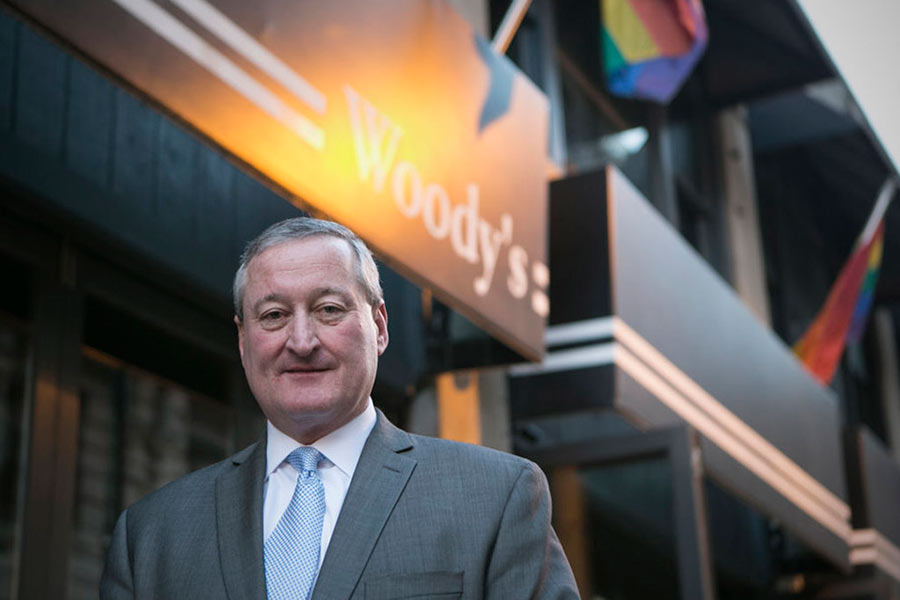Philadelphia’s primary election is May 21 and for the first time since 1987, the incumbent mayor will face primary challengers.
In 1987, then-District Attorney Ed Rendell tried to unseat Wilson Goode Sr. While Rendell lost, he came close. Four years later when he ran again, Rendell was elected mayor.
Kenney has been the strongest ally LGBTQ people have had in City Hall, surpassing even his predecessor, Michael Nutter.
Soon after taking office, Kenney created the Office of LGBT Affairs as a liaison between the mayor’s office and the city’s LGBTQ community.
Last month, Kenney announced he would order an investigation into whether Catholic Social Services and Bethany Christian Services violated city contracting laws by refusing to place foster children with same-sex couples.
Kenney has also taken on President Trump, maintaining the integrity of Philadelphia as a leading sanctuary city. On the day Trump’s Muslim ban was activated, Kenney headed directly to help with the crisis as travelers were being denied entry.
Kenney has been vocal in decrying Trump’s ban on trans persons serving in the military.
He has also pushed for the Safehouse injection site, which would help reduce opioid deaths as well as reduce HIV transmission.
Philadelphia is a one-party town. The last Republican mayor was Barney Samuel who left office in 1952. While there is a Republican challenger in every primary — this year South Philadelphia attorney Billy Ciancaglini — with registered Democrats exceeding Republicans seven to one in the city, whoever wins the Democratic primary will be the mayor-elect.
Kenney’s opposition consists of well-known local politicians with solid name-recognition, making this a real primary. State Senator Anthony Williams is one of West Philadelphia’s best-known politicians and has been in Harrisburg for 30 years, first as a state rep and since 2011 as Democratic Whip of the Pennsylvania Senate.
Alan Butkovitz was a state legislator from the Northeast for 14 years before his 12 years as Controller. He was ousted last year by Rebecca Rhynhardt, a staunch progressive and the first woman to hold the office. Rhynhardt was Kenney’s former chief administration officer.
Williams was one of one of six Democratic candidates running for mayor in 2015 when there was no incumbent and came in second with 26 percent of the vote in the primary, which Kenney won with 56 percent.
In a statement, Williams said he’s running because “the culmination of tremendous frustration about city government coupled with a nationwide, new energy in politics, sparked by revelations about the way Philadelphia is run behind closed doors make a powerful equation for change.”
Butkovitz cited Philadelphia’s “homicide crisis,” high poverty rate (Philadelphia is America’s poorest big city) and the soda tax as his reasons for running when he announced in November 2018. Butkovitz said of Kenney, “While he has given the back of his hand to poor people in this city, he’s also managed to antagonize businesses whose investment we need in order to create jobs for our local economy.”
In 2017, Butkovitz told PGN he should be re-elected as Controller because, “with the concentration of gays in Center City and among the very highly educated and sophisticated portion of the city, I think they want a progressive, scientific, fact-based and evidence-based government. We have been providing it.”
During the last mayor’s race, Williams told PGN, “I have always supported LGBT-inclusive legislation,” he said. “Two years ago, I introduced a conversion-therapy ban in Pennsylvania as a state senator.” Williams also said, “My votes and resolutions, my record as a state representative and senator, and most significantly the fact that I am here working with people that are different than me are all ways in which I have and will continue to lobby for inclusion.”
Lauren Hitt, a spokesperson for the Kenney campaign, reduced the challenges to a sound bite. Hitt said, “Philadelphians want a progressive leader who will stand up to the rich and powerful, not a corporate Democrat running to help billionaire soda CEOs.”
April 22 is the last day to register to vote in the primary. You must be a registered Democrat to vote in the Democratic primary.

